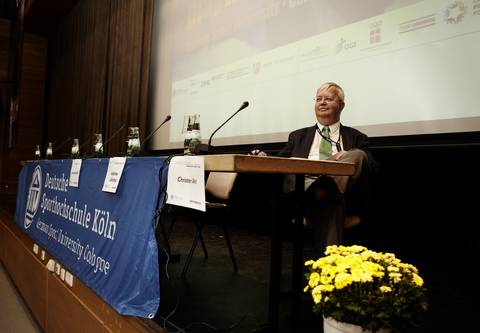A couple of weeks ago, I attended the ‘Play the Game’ conference at the German Sports University in Cologne. This organization is Danish-based and has gained a reputation over the past dozen years as the main forum for the fight against corruption and the debate of other critical issues, both through its conferences and its ongoing work. You can find out more about both the organization and the recent conference through their web site www.playthegame.org Over the next few weeks, I will be providing brief reports on a whole range on different topics from the conference.
A general problem in the fight against corruption is the regrettable fact that such issues are given far too little exposure in the media, inadequate attention by stakeholders such as sponsors, and very limited reporting by ‘whistleblowers’. This makes the job of ‘cleaning up’ much more difficult, something that was the topic of my interventions at the Conference.
In the world of sports today, the main focus is on the obvious state of corruption in FIFA, the international football federations. Football has more exposure and FIFA deals with much larger amounts of money than other sports. Accordingly its wrongdoings set a very negative example for all other sports.
Doping continues to be a topic of major controversy. It is generally felt that those who want to use science for illegal purposes are ahead of the detection efforts, something that causes a demand for stricter policies and procedures. At the same, there are increasing concerns about the rights of the athletes.
Gender issues have typically tended to involve accusations about inequities in the treatment of female athletes and a delay in getting their events recognized for the Olympics etc. But increasingly it has become necessary to deal with transgender issues, including the balance between fairness vis-à-vis other athletes and the rights to privacy and to participate in some way.
The role of sports in the Middle East has often focused on the participation of women. But during the political events in several countries this year, it has become evident that the sports fans have often used their strong organization and ‘anti-authoritarian tendencies’ to play a vital role.
The autonomy of the sports movement has been pushed very strongly by the IOC in recent years, to the point of suspending countries where governments have interfered in the management of sports. However, it is increasingly becoming clear that it is unrealistic and undesirable to force the governments to stay out in many instance where sports federation desperately need their support financially or in terms of managerial or organizational know-how.
Both the Olympic Games and the football world championships have created a very questionable and costly legacy in recent decades, through the construction of numerous large stadiums that become ‘white elephants’ and remain unused when the big event is over. This tends to be a huge waste of public money, often in countries that can ill afford it.
Match fixing, either in connection with illegal betting operations or simply in the traditional form of ‘arrangements’ between teams/athletes or with referees, has become the new cause for serious concerns in many sports. The amount of money involved can be huge, so the temptations are large, and the systems for monitoring and discovery are finding it difficult to keep up.
Other topics that may show up in some of my future articles include the feeble role of sponsors in the fight against corruption, the challenges facing Brazil as a host of both the football world championship in 2014 and the Olympic Games in 2016, the clear tendencies to an increase in violence in sports (especially on the part of spectators). I also plan to explain the circumstances surrounding the ‘Cologne Consensus’, a document that was the final product of the conference after consultations with the participants. It lays out possible ways in which the IOC could use its experience and leadership position to play a coordinating role in the overall fight against corruption in sports.
